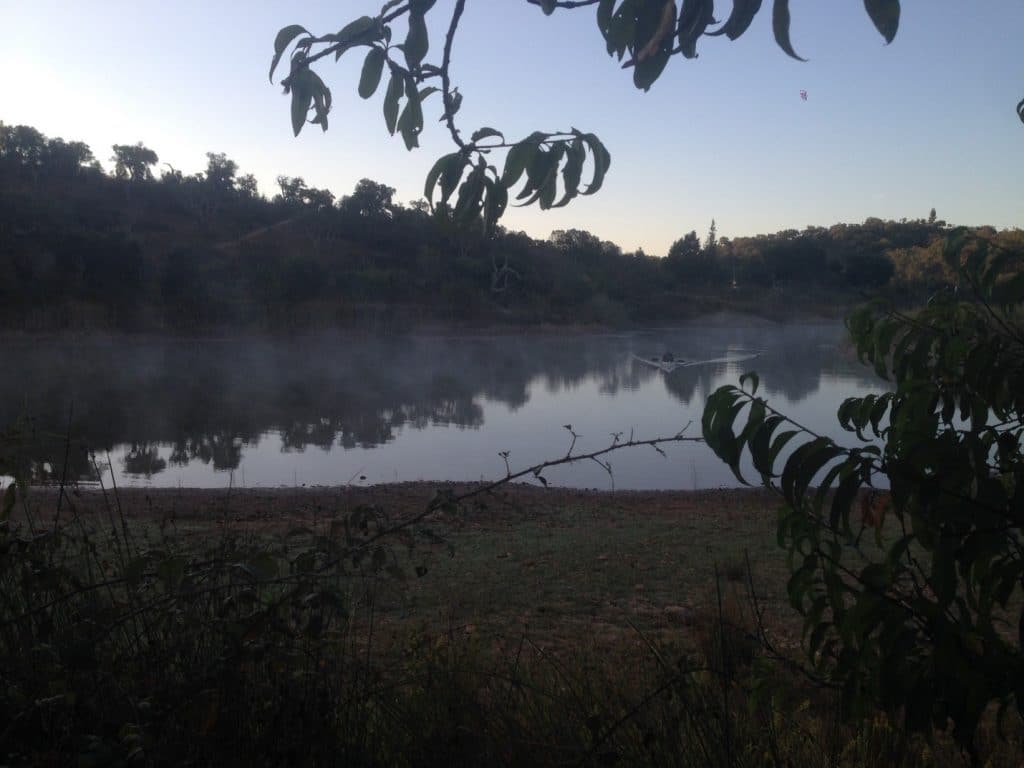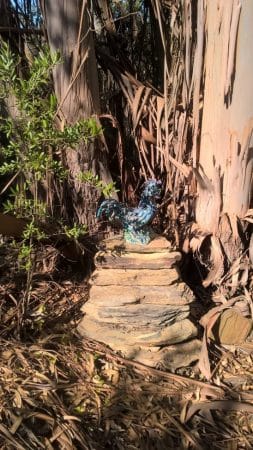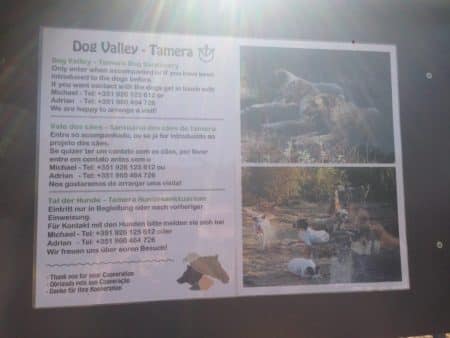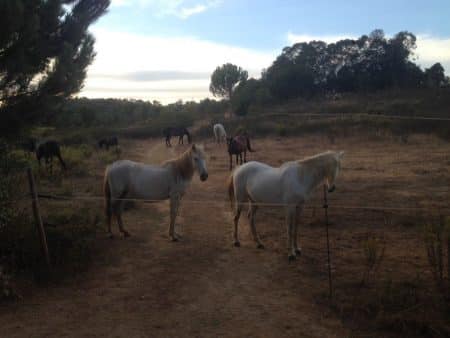Welcome to Tamera – an experiential community and peace research project

Morning mist on one of Tamera’s water retention lakes. Picture: Siri Pisters
At some point in history, with the evolving modern, instrumental worldview, humans placed themselves outside of nature on the basis that humans carry some sort of consciousness that non-humans do not[1]. This, according to many, has led to many of the environmental and ecological crises we face today[2]. It is perhaps high time then that we start re-connecting to the non-human world as part of a learning process towards a holistic and ecological understanding of the world. There are many ways to do this. In this blog post I will give the example of Tamera, an intentional community in the south of Portugal that works a lot on re-establishing a relation between humans and nonhumans that is based on trust.
Tamera is one of the three case studies in my research project about ecovillages. The ecovillage movement aims at transforming the world in which we live by creating conscious, intentional communities all over the world[3]. These communities can take many shapes and forms. In the ecovillage definition of community, a community is not just the people in it. A community ideally refers to the human and the non-human in a certain place[4]. Adopting such an inclusive understanding of community in our current society is, I believe, key in shifting our human-centered view of the world in which we live.
In Tamera, this inclusive notion of community has resulted in a very interesting place shaping and community building process amongst people, the place, the water, the land, the animals, the plants and all other visible and nonvisible beings. Tamera is referred to as Healing Biotope I. The project researches all areas of life on this planet that need healing in their point of view. One such area is the space between humans and animals in which a lot of unnecessary fear resides in Tamera’s understanding. Tamera works on this in many different ways. Some examples:
Terra Deva, a spiritual ecology area

Tamera has dedicated fifteen acres of land to research how to ‘regenerate devastated landscapes and habitats and find ways in which the food of the future can be produced’ in ‘contact and cooperation with all beings’[5]. This includes finding ways to communicate with other species so that any interaction between humans and other species can take place in trust. In practice this means a lot of experimenting and learning how to ‘tune into’ species other than our own. One example of such an experiment is giving chicken the choice as to for which purpose they lay eggs. Three different places are set up for chicken to lay their eggs. One is for the purpose of human consumption, the other for consumption by other wild animals including foxes and wild pigs and in the third place the eggs are left to breed. This experiment is part of exploring the question ‘will chickens that live in trust and contact with people voluntarily surrender their eggs to them?’(ibid).
Another animal the Terra Deva people work with is the wild boar. Wild boars walk in and around Tamera. Even though they are not dangerous they do destroy the garden and tend to eat roots and vegetables meant for human consumption. Instead of putting fences or chasing them away Tamera tries to come to agreements with the wild pigs by finding ways to communicate with them.
Now I believe it is not about whether we all believe that chicken will actually consciously make a decision as to where to lay their eggs. The question is more whether we allow ourselves to open up to the mere possibility that nature is not an unanimated (without a soul) entity. Such a shift in perspective should also make us question how we ourselves relate to nature or the nonhuman in our own lives.
Dog shelter

Tamera also has a dog shelter aiming to help dogs in the Alantejo region in Portugal. The dogs live in a herd and much thought is given as to what kind of environment allows a dog to really be a dog. Tamera also chooses to promote castration among Portuguese dogs as there are so many of them living terrible lives. For example dogs who have been used for herding and are now ‘redundant’ as a result of EU regulations concerning land enclosures. These dogs without a purpose sadly can become a burden to rural households that are often struggling to make ends meet.
Horses

During my stay in Tamera I participated in their ‘horse course’ and learned about the work they do with horses. The horse project departs from the idea that contact between horses and humans can be healing for both sites. Humans can learn from horses how to be in service for other beings on this planet in a responsible way. The horses live in a herd as they are naturally group animals. The project gives horses ‘without a purpose’ (e.g. unfit for horse racing) a purpose again based on their inherent worth. Indirectly the project aims to raise consciousness about the political situation of animals worldwide and explore what we as humans can do to be a positive force.
Apart from these projects, there are many more things in the Tamera project that aim to contribute to a loving relationship between humans and other species. A water retention landscape regenerates the land and the soil creating a home for many different animal species including hundreds of different bird species. There are spaces for births to nest in the roofs of compost toilets. The food prepared for the hundreds of guests that visit Tamera each summer is fully vegan. Tamera is part of a global alliance that works towards a world in which humans no longer dominate but cooperate with all the other life forms on this planet. Defending the Portuguese coast from oil drilling is an example of the kind of activism within this alliance.
As taking away fear will mean that we create more space for love in the human-nature realm, working towards such a state, in whichever way suits you, can bring a lot of joy!
To learn more about my research and my Finnish case studies, please visit my personal blog!
[1] Tarnas, R. (1993). The Passion of the Western Mind: Understanding the ideas that have shaped our worldview. p.454-460
[2] See for example: de Witt, A. H. (2013). Worldviews and their significance for the global sustainable development debate. Environmental Ethics, 53(2).
[3] See for example https://ecovillage.org/
[4] Kasper, D. (2008). Redefining community in the ecovillage. Human Ecology Review, 15(1).
[5] Tamera’s website – https://www.tamera.org/project-groups/feminine-peace-wisdom/terra-deva/ Accessed 1-11-2017
